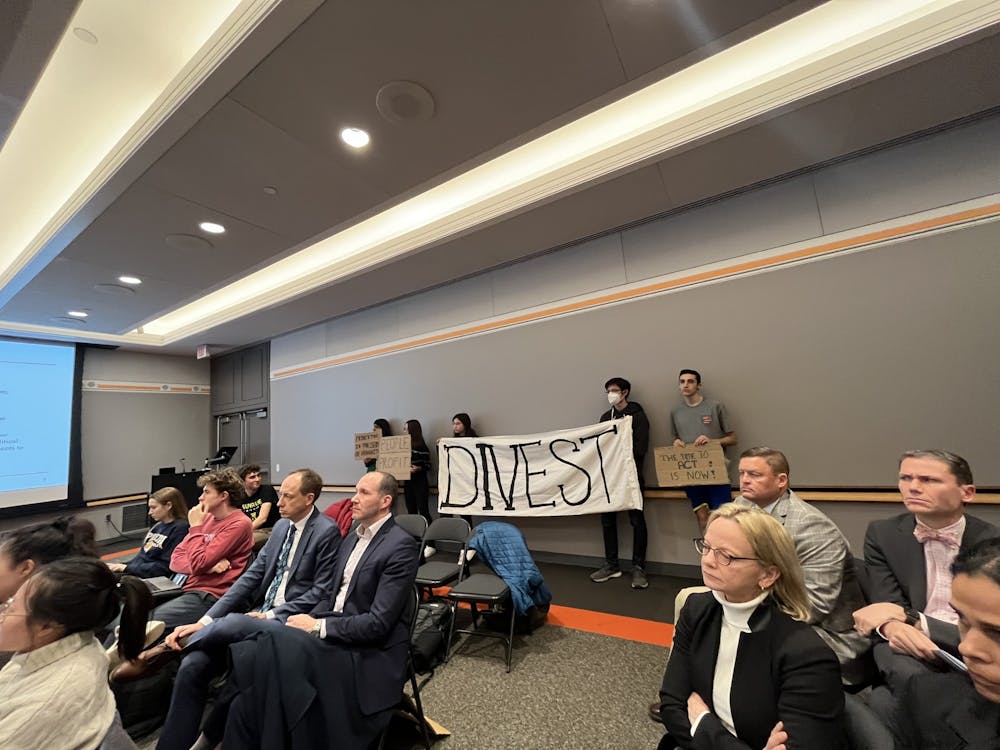On Monday, Nov. 14, University officials, staff, and students gathered for the second Council of the Princeton University Community (CPUC) meeting of the semester to hear updates on dissociation from fossil fuels, reports from committees, and discussions on how to approach campus grief.
The Council also discussed facility staff workers’ grievances, the new Learning and Education through Service (LENS) program, updates on the new minors program, and the upcoming Wintersession.
Institutional neutrality, Witherspoon statue
Sociology professor Shamus Khan announced that University President Christopher Eisgruber ’83 requested he lead a subcommittee to create a policy for “statement-making by units of the University.” Khan said these policies would not apply to individual faculty members making personal statements.
These policies will not apply to individual faculty members making personal statements.
Eisgruber said at the meeting that his request to Khan comes in the wake of “increasing concerns” brought by individuals “about statements that are appearing on websites, and are worried that those statements may at times create a sense that certain opinions are orthodox or required at the University.”
Concerns on institutional neutrality and free speech have come to the surface in recent months in the wake of a series of incidents related to academic freedom. Earlier this month, Eisgruber announced the committee in Princeton Alumni Weekly.
“I recently asked a faculty committee to consider whether Princeton should have a policy regulating the discretion of academic or administrative units to publish opinions on behalf of the unit,” the president wrote. “I expect the committee to make recommendations to the faculty in the spring semester.”

In addition, Council members unanimously voted to approve the creation of the CPUC Committee on Naming as a standing committee. The Committee on Naming, originally developed as a temporary committee in 2016 to increase University community involvement for naming buildings, has remained a part of CPUC as naming concerns have persisted.
Nakia White Barr, the assistant vice president in the Office of the President, also serves as secretary of the Naming Committee. She announced that the committee is considering a proposal to remove or replace the statue of John Witherspoon, which was placed in the Firestone Plaza in 2001.
“[The Committee] will evaluate this question with consideration of established principles to govern renaming and changes to campus iconography which provide among other things that the process should be open to community input,” Barr said.
Read more: CPUC considers proposal on removing Witherspoon Statue

Dissociation update
In the wake of the University’s dissociation from 90 fossil fuel companies in September, Eisgruber gave a presentation elaborating on the University’s announcement, which included the criteria that must be met for dissociation to occur. The criteria according to the presentation are:
“1. An issue attracts considerable thoughtful and sustained campus attention. 2. The request or proposal for dissociation pertains to a central University value, in this case, the University values around our commitment to sustainability. 3. The University campus can reach consensus on how to respond.”
Eisgruber elaborated on the timeline towards dissociation from the fossil fuel industry that began in 2020. He acknowledged that these efforts started with Divest Princeton, as students in that group held up signs in the back of the meeting room throughout the presentation. Eisgruber emphasized that the recent announcement towards dissociation is an initial step toward achieving a net zero endowment.
He also stated that the bar for dissociation on the basis of disinformation was determined to be “exceedingly high, especially in the absence of quantitative standards and in light of the University’s commitment to embracing the vigorous exchange of ideas.”
“The board may in the future identify companies that meet this exceedingly high bar,” Eisgruber added.
Additionally, the University plans to establish a new fund to support energy research to offset lost costs due to disassociation.
Eisgruber then responded to a question from Divest organizer Alex Norbrook ’26 about when Princeton will refuse all fossil fuel funds for research.
“There are good reasons for engineering connections with sectors of the fossil fuel industry, that benefits can come from collaborations,” Eisgruber said. “Those collaborations are valuable in terms of the research that they produce.”
In a follow-up question on whether Princeton will continue to support BP, an oil and gas company which has been sued by the state of New Jersey for spreading disinformation, Eisgruber responded that “is a very loaded question, there are many disagreements about the value and extent of disinformation.”
Campus grief
Audience members heard from Vice President for Campus Life Rochelle Calhoun about campus action following the recent campus tragedy when Misrach Ewunetie ’24 passed away.
Calhoun mentioned efforts to build stronger community connections, the need to pause and remember, the campus community’s commitment to investing attention in smaller intact communities, and increasing visibility of comprehensive administrative responses.
Turning to next steps, Calhoun recapped ideas that were discussed at a campus community breakfast, including an idea for a “wind phone” proposed by Chioma Ugwonali ’24 and Stephen Daniels ’24, a Wintersession restorative practices workshop, a service of remembrance, Community of Care meals, and a mental health luncheon to be hosted on Dec. 8.
Other topics included in Calhoun’s presentation were a cell phone-free day, suspending classes, using art as a tool to explore grief, and creating a place to reflect and commemorate our losses.
Facilities staff grievances
In the portion of the meeting dedicated to pre-submitted audience questions, two facilities workers asked why raises promised in 2020 were not instituted for non-union workers when union and non-union workers work side-by-side. (The ‘Prince’ was unable to verify the identities of the workers.)
One explained that he “has been here for 46 years and this is the first year that non-union workers didn’t get a raise.” The staff member explained that the raise would have been helpful in light of inflation.
In response, Eisgruber and University Provost Deborah Prentice both explained that human resources should take the matter up with the Priorities Committee, which is in charge of negotiating salary pools.
LENS, minors program, and Wintersession
The new LENS program was announced by Kimberly de los Santos, executive director of the Pace Center for Civic Engagement.
She clarified the intention of the LENS program, stating that the University offers opportunities for students to engage in paid service internships, which will make these positions more accessible for students.
The meeting concluded with an overview of the transition from the certificate program to minors program and stated that the program will be available starting with the Class of 2025.
This was followed by an announcement of Wintersession’s 2023 expected offerings, which will include courses taught by Dean of the College Jill Dolan and Eisgruber. The total number of offerings is expected to exceed 500.
CPUC’s next meeting will occur on Monday, Dec. 12 from 4:30 p.m. to 6:00 p.m. in Frist Campus Center’s Multipurpose Room and is open to all University community members.
Olivia Sanchez is a news contributor for the ‘Prince.’
Abby Leibowitz is a news contributor for the ‘Prince.’
Please direct any corrections requests to corrections@dailyprincetonian.com.








